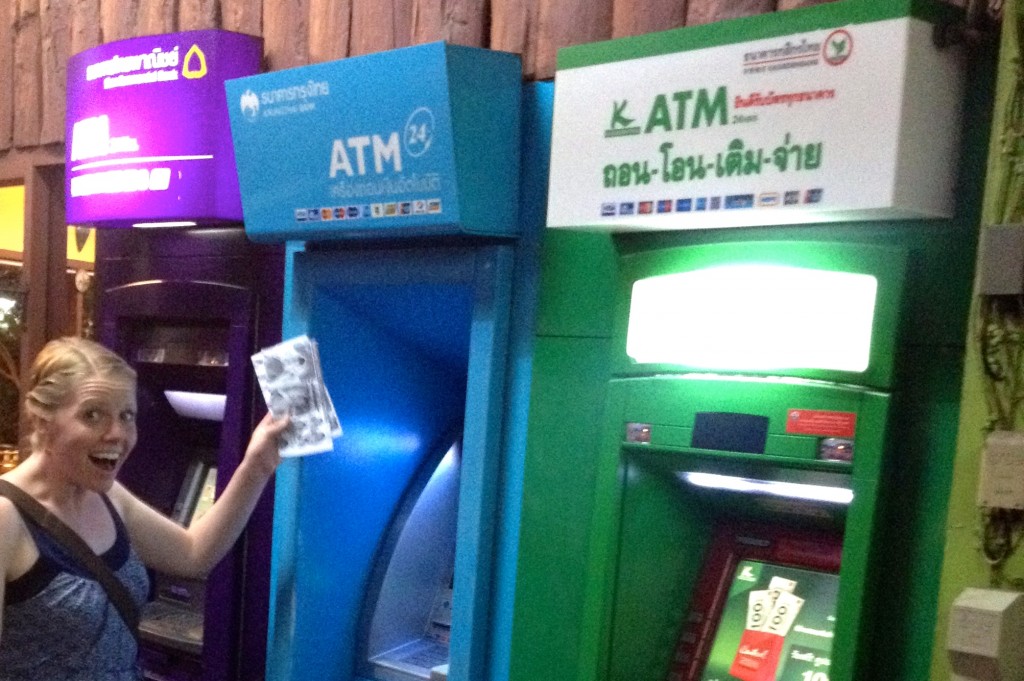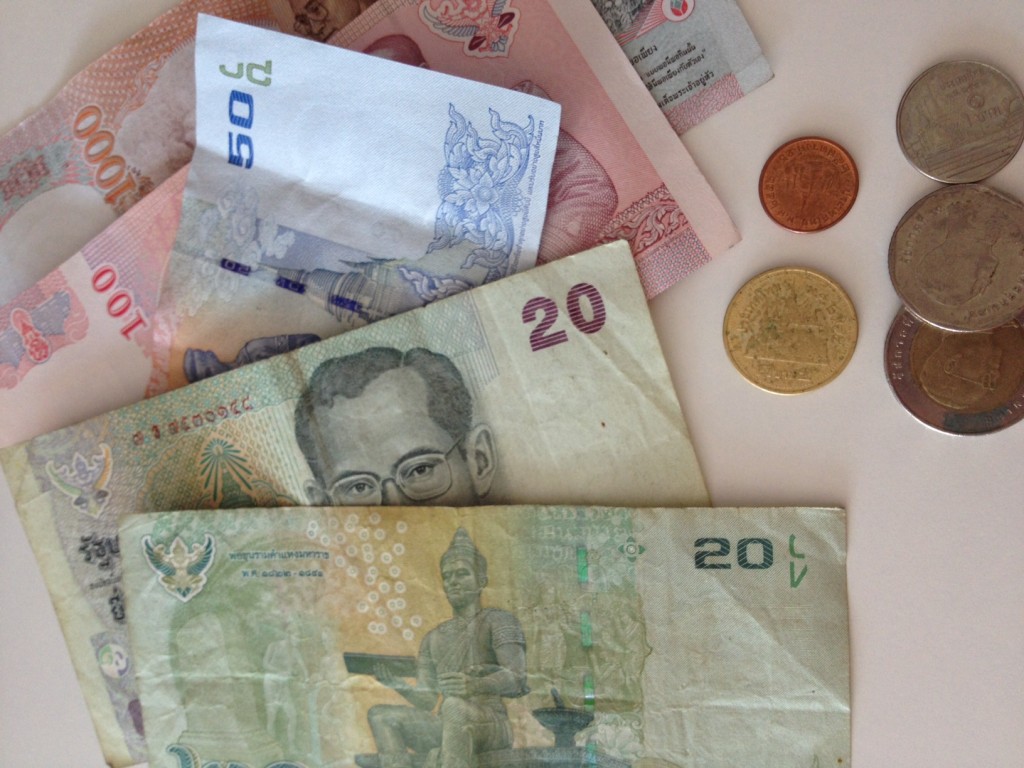Did you know that a typical ATM withdrawal fee in Thailand is 180 Baht (about $6 US)? Did you know that many credit cards charge a 3% foreign transaction fee? Or how about that many establishments charge an extra fee for you to pay with plastic? Aside from hotels and nicer restaurants that we don’t tend to frequent very often (such is the life of the unemployed), Thailand has mostly a cash-based economy, and you may get laughed at if you try to offer up a credit card when it comes time to pay.
So how can you minimize your losses when obtaining Thai Currency? Here are a few tips.
For Short Term Travelers:
- Get a little Thai currency before you leave home, if possible. Check with your local bank to see if they offer a reasonable exchange rate for Thai Baht. If they do, we recommend changing about $30 USD for Thai Baht. This should get you through your airport connection, and pay for any early transportation costs in Thailand. (This is especially true if you’re traveling to Chiang Mai – Taxi fares in Chiang Mai from the airport to any hotel in the city are currently pegged at a cost of 120 Baht, or about $4. So cheap!)
- Identify at least 2 credit cards and 2 ATM cards you can use abroad, and call those banks to:
- Ask what fees apply to card usage / ATM withdrawals in foreign countries.
- Ask the bank to place a travel notice on your cards. Banks may suspect your cards were stolen and freeze them if you use them in a foreign country without notifying them of your travel plans! We all know they do this for our own good, but in a foreign country where calls to the US are expensive and confusing to make, this can be a nightmare!
- Typically, the best exchange rates are obtained at an ATM. The fee most foreign ATMs charge tends to be a flat rate regardless of the amount you withdraw, so you should take out as much as you can per transaction. Many Thai ATMs can distribute a maximum of 20 bills at a time, which means a maximum of 20,000 THB (about $600 US). This will last you a LONG time in Thailand.
- In addition to figuring out how which ATM card is best to use in Thailand, it always gives me a warm fuzzy feeling to travel with a little extra U.S. cash. Withdraw some crisp, new $100 bills from your local bank to bring over from the U.S. to exchange. There are places to exchange currency nearly everywhere you turn in Thailand, and they almost always offer a better rate for $100 bills than for $50s; some will even refuse old tattered bills. The best currency exchange rates can be found if you go into a bank, rather than the kiosks on the street.
For Long Term Travelers and Frequent International Travelers:
- Get an ATM card at a bank that refunds foreign ATM fees! This is the single most important thing you should do if you spend extended amounts of time abroad. We have a Schwab High Yield Investor Checking account. In order to open one of these accounts, you also have to open a a Schwab One Brokerage Account and link the two accounts. With these accounts opened and linked, neither will have any fees or minimum balance requirements. ATM fees are refunded automagically at the end of each month. Some helpful tips:
- Start the application process for these accounts two months before leaving home so you can receive your new cards in the mail with plenty of time to spare.
- Before leaving home, link the Schwab checking account to one of your other bank accounts so you can transfer money easily. This requires mailing in a paper form. (I know, what is this, the 80’s?! Is it time to bust out my stirrup pants and t-shirt rings?!) Allow ample time for this step! We sent in the wrong form the first time, of course.
- As a rule of thumb, we aim to keep a zero balance in the Schwab account most of the time in case our ATM card gets skimmed/stolen. When we need money, we schedule a transfer (which usually takes 4-5 days to complete) and withdraw the money as soon as its in the Schwab account.
- Be sure you understand your daily ATM withdrawal limits and what happens if you try to overdraft. This is important to know, especially if you need to take out large amounts of money each month to pay for apartment rent. We specifically ensured that transactions would be rejected if the account balance was zero.
- Get a credit card with no foreign transaction fees! We use the Chase United Plus card, which comes with perks like bonus miles, free checked bags, priority boarding, and 2 United Club passes per year. The annual fee of $95 is waived for the first year, but Kevin has been successful 2 years in a row at getting this fee waived by calling and threatening to cancel the card.
Safety Tips

Here I am, acting suspicious at the ATMs.
If anyone sees this, I’m now in a Thai Jail. Please send money. (KIDDING)
- Because ATM card skimming can happen anywhere in the world, you should follow a few precautions when withdrawing money. Pick a non-sketchy-looking ATM, however you choose to define that. We like to find newer ATMs that adjoin a bank, or look for ATMs the locals seem to favor using. We avoid dark alleyways and ATMs near packs of young hooligans. Always give the card reader a little tug before inserting your card, to make sure nothing extra has been attached to it to steal your card info. And always, always, always cover your hand when entering your pin number at the ATM!
- If you bring over lots of cash, protect it! At hotels, we like to use a cable and luggage lock to lock up our bags up and secure them to something in the room. This sure beats carrying a thousand bucks in your purse when you’re walking around unfamiliar places.
Future Posts
We want to post about things that interest you! I know I’ve talked a lot lately about chapped asses and bathroom escapades, but blogging about those topics alone is not sustainable. It also makes me feel like a huge weirdo. In the future, we’re hoping to blog about what we do in a typical day, going to the dentist in Thailand, what we packed, and preparations we made before leaving Seattle. If you have suggestions for future blog post topics, please leave us a comment to let us know!
